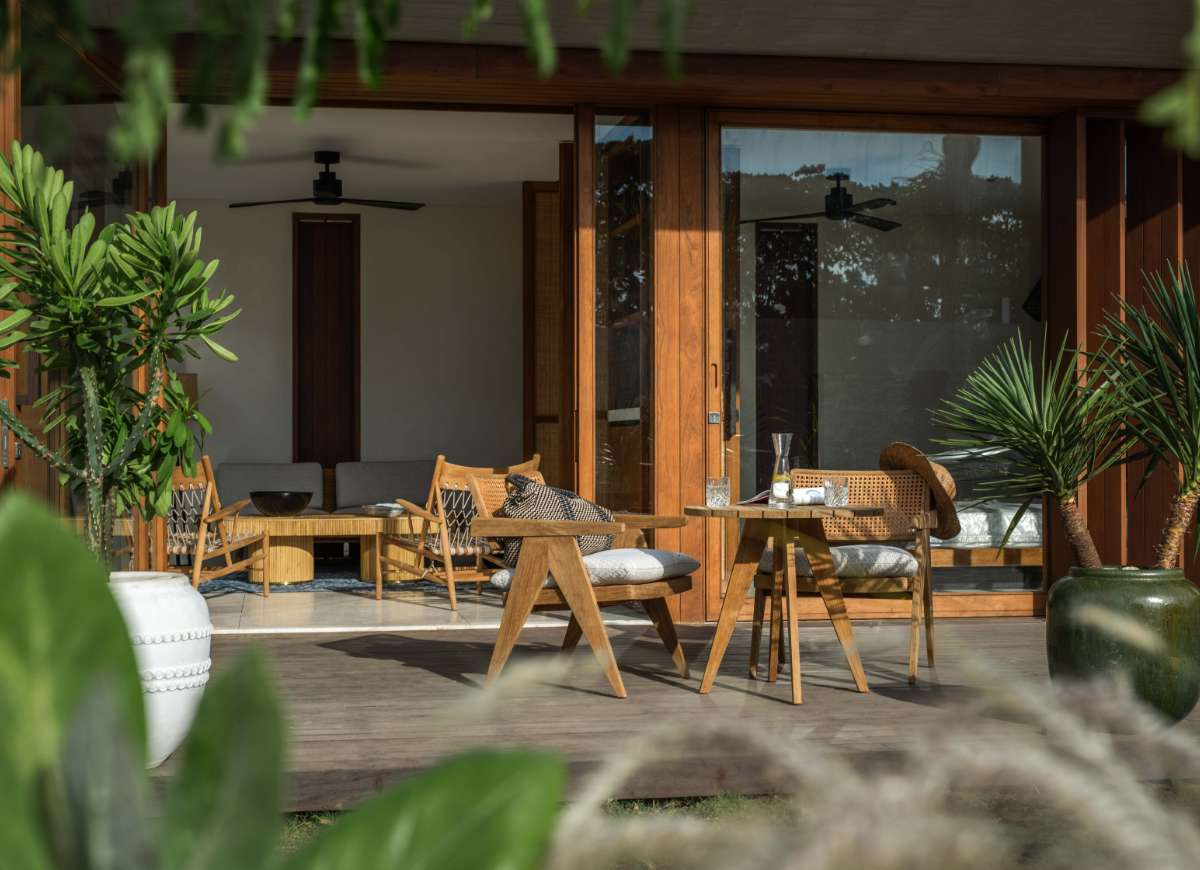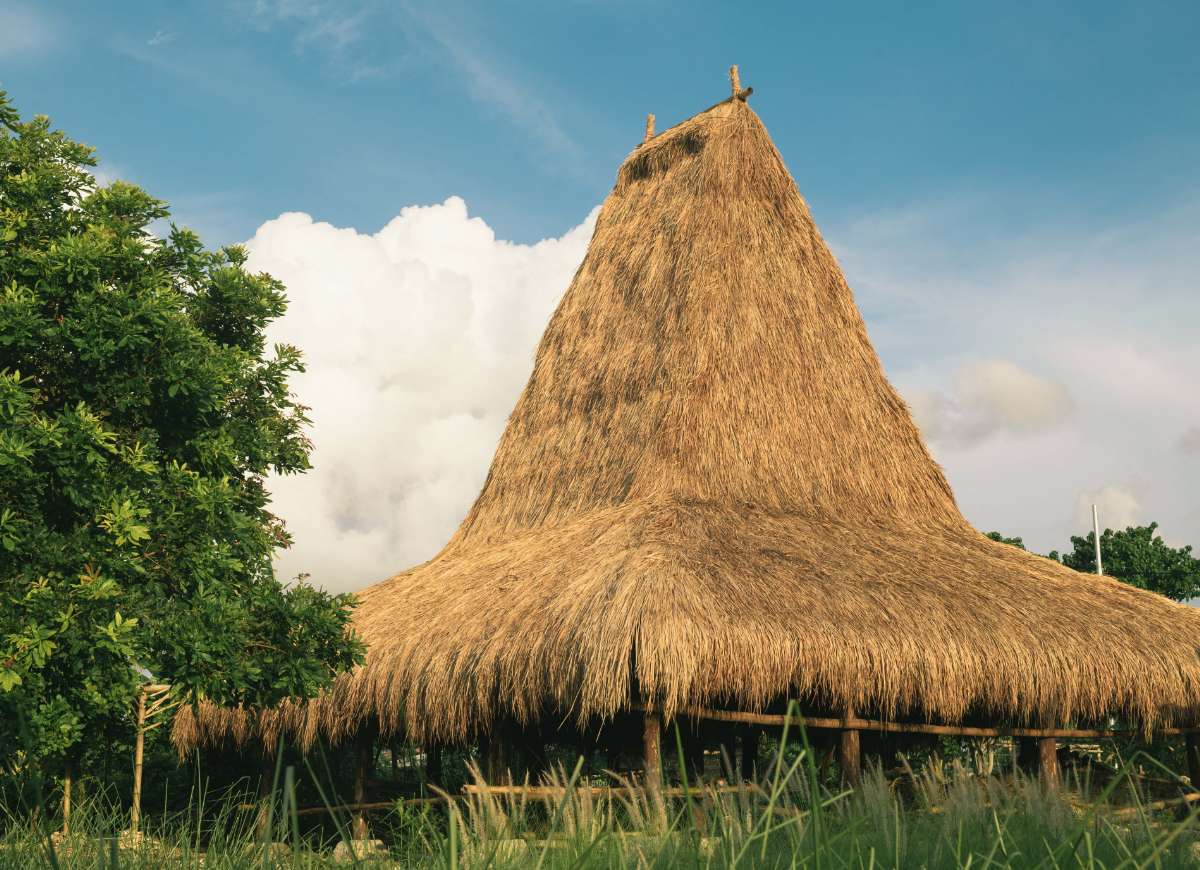
When a French couple found the Indonesian island of Sumba, they fell in love with not only the environment but also the local culture. Now, they’ve opened the doors to the boutique Cap Karoso, an eco-conscious hotel.

When a French couple found the Indonesian island of Sumba, they fell in love with not only the environment but also the local culture. Now, they’ve opened the doors to the boutique Cap Karoso, an eco-conscious hotel.
The story behind the creation of Cap Karoso, on Sumba Island in Indonesia, reads like the pages of a romantic, French adventure novel. Almost by chance, talented Parisian couple Evguenia and Fabrice Ivara, both with a passion for design, gastronomy and craftsmanship, visit the island of Sumba and are so enamoured they decide to build and open a sustainable hotel.
Evguenia had a background in product development for luxury brands such as Louis Vuitton and Dom Pérignon; while her husband Fabrice operated business ventures in finance and digital, along with living a passion for gastronomy through his award-winning ‘foodie’ blog, Coup de Fourchette.
Developing an eco-conscious retreat on Karoso Beach has been a labour of love for these first-time hoteliers while navigating a pandemic during construction. At the 47-room and 20-beachfront-villa Cap Karoso, a member of Design Hotels, the pair aim to create authentic travel experiences and a true community spirit – as well as provide a gateway to the tightly preserved culture and landscape of Sumba.
Design inspiration
The interior design and architecture were led by Jakarta-based Bitte Design Studio, whose founding ethos of sustainability proved a natural match for this project. The firm has fused local traditions and crafts to create an artful backdrop. The owners are keen to pay equal reverence to both local culture and their own native, French flair.
A blueprint from architect Gary Fell has seamlessly merged the traditionally styled pavilions at the heart of the property with a series of modern structures, as well as successfully fusing the indoors and outdoors. A local theme is strongly showcased in all the accommodations. In these spaces, guests are immersed in the story of Sumba by way of visual references to the local religion, Marapu, and the integration of art, materials, and crafts inspired by local aesthetics. Locally and sustainably sourced materials, including Sumba stone in the bathrooms, are utilised throughout.
Meeting with Evguenia recently at a luxury travel event in Bali, she explained how the local crafts are distinct from those found in Bali.
“We didn’t copy and paste elements because then you strip the meaning,” she said. “We have created a cultural bridge rather than a copy. We want to ignite the curiosity of our guests.
“It was not an easy task to introduce the local culture to our guests. So, our idea was to do it with the help of art. We commissioned several Indonesian artists to give their perspectives on Sumbanese culture and its symbols. One of them is Alexander Sebastianus Hartanto who works with Sumbanese textiles, playing with the identity and history of the indigenous culture and land. We showcase all the artwork in our rooms, and we also have a program for installations and artist residencies.”
Defined by a largely untouched landscape, which places megalithic tombs side-by-side with soaring peaked houses known as uma mbatangu, the choice of Sumba for Cap Karoso was a pledge to both preservation and exploration, with local involvement inherent to the project from the onset.
Sustainability
The owners are committed to ensuring its environmental footprint is minimal, with a range of sustainability-minded practices already actioned. These include drawing at least 50 per cent of energy use from an onsite solar panel park, a ban on plastic packaging on the property, and the thoughtful use of landscape design and vegetation placement to reduce the need for air-conditioning.
The 3ha Cap Karoso Farm is an expansive working estate set up about two years ago by organic agriculturalist Philippe Guiglionda, that supplies the hotel’s restaurants with homegrown and organic eggs, dairy, fruit, and vegetables.
“We have animals that eat the surplus food from the restaurant, and they also naturally fertilise the land. We aim to open a small school to teach about sustainability, landscaping, and organic farming. We would be giving people useful skills, for example, in the hotel industry. This is our way of giving back to the local community,” said Fabrice.
“We chose Sumba because it is pristine and not polluted like many other Indonesian islands,” adds Evgeunia. “From the start, our aim with Cap Karoso was to reduce energy consumption and be smart about water usage and waste treatment.”
Staying here
Cap Karoso is located at Kodi, on the western side of Sumba Island, Indonesia. Guests can reach the hotel after a 50-minute flight from Bali. Authentic experiences are designed to connect guests with the local environs and people. Swim or snorkel in the peaceful Karoso Lagoon, ride the surf break at Pero, fish with locals, or dive into the waters of the Weekuri saltwater lake. On land, you can hike, cycle, or head out in one of the hotel’s electric cars to explore tropical forests, savanna, or waterfalls.
At the hotel, a casual all-day Beach Club offers family-inspired cuisine created with local produce with a zero-waste objective, while the lobby-adjacent Julang restaurant is operated by international chefs visiting for short takeovers. Other facilities include an open-air cinema, a pool with a bar, a kids club; and a spa, gym, and yoga platform. With a love of collaborations, Evgeunia and Fabrice will host visiting artists and DJs each year for a truly original ambience.
“We feel like there’s a part of Paris within us that goes wherever we go. For example, we envision our beach club exhibiting the kind of lively vibe of a Parisian brasserie, and we’ve brought a handful of Parisian talents with us — so the project feels rooted in Paris, conceptually speaking,” said Evgeunia.
Rates start from US$225 (about AUD$334) per room, per night, excluding taxes and fees.
Latest Articles
Don't miss the latest from Luxury Travel
